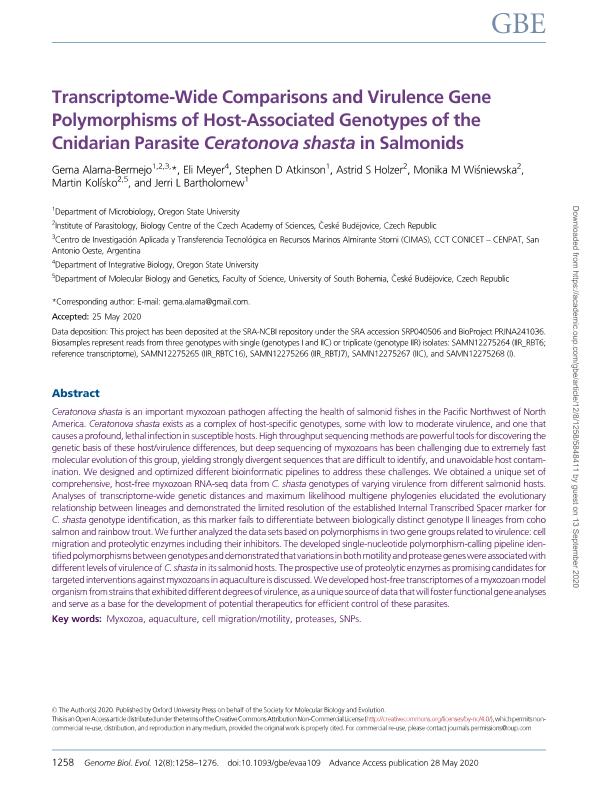Mostrar el registro sencillo del ítem
dc.contributor.author
Alama Bermejo, Gema

dc.contributor.author
Meyer, Eli
dc.contributor.author
Atkinson, Stephen D.
dc.contributor.author
Holzer, Astrid S.
dc.contributor.author
Wiśniewska, Monika M.
dc.contributor.author
Kolísko, Martin
dc.contributor.author
Bartholomew, Jerri

dc.date.available
2021-09-07T18:30:51Z
dc.date.issued
2020-05
dc.identifier.citation
Alama Bermejo, Gema; Meyer, Eli; Atkinson, Stephen D.; Holzer, Astrid S.; Wiśniewska, Monika M.; et al.; Transcriptome-Wide Comparisons and Virulence Gene Polymorphisms of Host-Associated Genotypes of the Cnidarian Parasite Ceratonova shasta in Salmonids; Oxford University Press; Genome Biology and Evolution; 12; 8; 5-2020; 1258-1276
dc.identifier.uri
http://hdl.handle.net/11336/139838
dc.description.abstract
Ceratonova shasta is an important myxozoan pathogen affecting the health of salmonid fishes in the Pacific Northwest of North America. Ceratonova shasta exists as a complex of host-specific genotypes, some with low to moderate virulence, and one that causes a profound, lethal infection in susceptible hosts. High throughput sequencing methods are powerful tools for discovering the genetic basis of these host/virulence differences, but deep sequencing of myxozoans has been challenging due to extremely fast molecular evolution of this group, yielding strongly divergent sequences that are difficult to identify, and unavoidable host contamination. We designed and optimized different bioinformatic pipelines to address these challenges. We obtained a unique set of comprehensive, host-free myxozoan RNA-seq data from C. shasta genotypes of varying virulence from different salmonid hosts. Analyses of transcriptome-wide genetic distances and maximum likelihood multigene phylogenies elucidated the evolutionary relationship between lineages and demonstrated the limited resolution of the established Internal Transcribed Spacer marker for C. shasta genotype identification, as this marker fails to differentiate between biologically distinct genotype II lineages from coho salmon and rainbow trout. We further analyzed the data sets based on polymorphisms in two gene groups related to virulence: cell migration and proteolytic enzymes including their inhibitors. The developed single-nucleotide polymorphism-calling pipeline identified polymorphisms between genotypes and demonstrated that variations in both motility and protease genes were associated with different levels of virulence of C. shasta in its salmonid hosts. The prospective use of proteolytic enzymes as promising candidates for targeted interventions against myxozoans in aquaculture is discussed. We developed host-free transcriptomes of a myxozoan model organism from strains that exhibited different degrees of virulence, as a unique source of data that will foster functional gene analyses and serve as a base for the development of potential therapeutics for efficient control of these parasites.
dc.format
application/pdf
dc.language.iso
eng
dc.publisher
Oxford University Press
dc.rights
info:eu-repo/semantics/openAccess
dc.rights.uri
https://creativecommons.org/licenses/by-nc/2.5/ar/
dc.subject
MYXOZOA
dc.subject
AQUACULTURE
dc.subject
CELL MIGRATION/MOTILITY
dc.subject
PROTEASES
dc.subject
SNPs
dc.subject.classification
Genética y Herencia

dc.subject.classification
Ciencias Biológicas

dc.subject.classification
CIENCIAS NATURALES Y EXACTAS

dc.title
Transcriptome-Wide Comparisons and Virulence Gene Polymorphisms of Host-Associated Genotypes of the Cnidarian Parasite Ceratonova shasta in Salmonids
dc.type
info:eu-repo/semantics/article
dc.type
info:ar-repo/semantics/artículo
dc.type
info:eu-repo/semantics/publishedVersion
dc.date.updated
2021-09-06T15:05:40Z
dc.identifier.eissn
1759-6653
dc.journal.volume
12
dc.journal.number
8
dc.journal.pagination
1258-1276
dc.journal.pais
Reino Unido

dc.journal.ciudad
Oxford
dc.conicet.avisoEditorial
© The Author(s) 2020. Published by Oxford University Press on behalf of the Society for Molecular Biology and Evolution.
This is an Open Access article distributed under the terms of the Creative Commons Attribution Non-Commercial License (http://creativecommons.org/licenses/by-nc/4.0/), which permits non-commercial re-use, distribution, and reproduction in any medium, provided the original work is properly cited. For commercial re-use, please contact journals.permissions@oup.com.
dc.description.fil
Fil: Alama Bermejo, Gema. Universidad Nacional del Comahue. Centro de Investigación Aplicada y Transferencia Tecnológica en Recursos Marinos "Almirante Storni". - Provincia de Río Negro. Ministerio de Agricultura, Ganadería y Pesca. Centro de Investigación Aplicada y Transferencia Tecnológica en Recursos Marinos "Almirante Storni". Consejo Nacional de Investigaciones Científicas y Técnicas. Centro Científico Tecnológico Conicet Centro Nacional Patagónico. Centro de Investigación Aplicada y Transferencia Tecnológica en Recursos Marinos "Almirante Storni"; Argentina. Academy of Sciences of the Czech Republic. Biology Centre. Institute of Parasitology; República Checa. State University of Oregon; Estados Unidos
dc.description.fil
Fil: Meyer, Eli. Oregon State University; Estados Unidos
dc.description.fil
Fil: Atkinson, Stephen D.. Oregon State University; Estados Unidos
dc.description.fil
Fil: Holzer, Astrid S.. Academy of Sciences of the Czech Republic. Biology Centre. Institute of Parasitology; República Checa
dc.description.fil
Fil: Wiśniewska, Monika M.. Academy of Sciences of the Czech Republic. Biology Centre. Institute of Parasitology; República Checa
dc.description.fil
Fil: Kolísko, Martin. Academy of Sciences of the Czech Republic. Biology Centre. Institute of Parasitology; República Checa. University of South Bohemia; República Checa
dc.description.fil
Fil: Bartholomew, Jerri. Oregon State University; Estados Unidos
dc.journal.title
Genome Biology and Evolution
dc.relation.alternativeid
info:eu-repo/semantics/altIdentifier/doi/http://dx.doi.org/10.1093/GBE/EVAA109
dc.relation.alternativeid
info:eu-repo/semantics/altIdentifier/url/https://academic.oup.com/gbe/article/12/8/1258/5848411
Archivos asociados
